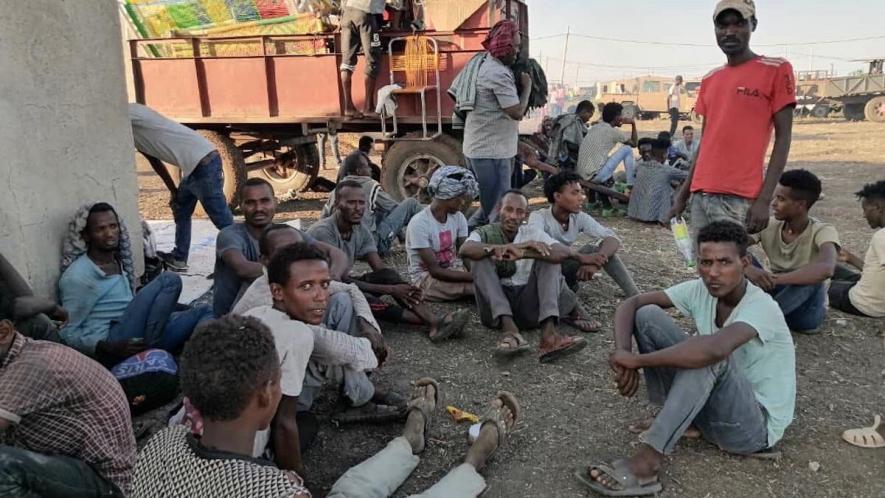Sudan and Ethiopia Fail to Reach an Agreement on Border Demarcation

(Photo: Stringer/Anadolu Agency)
Talks between the authorities of Sudan and Ethiopia to demarcate their 1,600 kilometer-long border ended on Wednesday, December 23, without yielding a solution. The talks took place in the backdrop of the recent clashes along the border.
Ethiopia, which is also mired in an armed conflict in its northern state of Tigray – bordering Sudan and Eritrea – has refused to agree to the 1903 border delineation drawn by the British which at the time had colonized Sudan.
The two days-long meeting was held in Sudanese capital Khartoum and saw Ethiopian foreign minister and deputy prime minister Demeke Mekonnen meet the Sudanese delegation led by minister in charge of the cabinet Omar Manis.
The meeting assumed particular urgency, being held only a week after the Ethiopian forces reportedly attacked a Sudanese patrol across the border on December 15. One officer and three soldiers were killed and 20 others were wounded, as per reports.
Citing an unnamed soldier, Sudan Tribune reported that the army patrol “came under artillery shelling from the Ethiopian troops that sneaked into the.. al-Teyyour area at a depth of 7 km in the Sudanese territory. The attack tactic suggests that it was the work of organized forces and not just militias.”
Ethiopia maintains that the attack was launched by the Amhara ethnic militia, which is controlled by the Amhara regional State. Ethiopia’s States are divided along ethnic lines, with each State government commanding militias of its own.
Amhara flanks the Tigray State on its south and Amharan militias are supporting the Ethiopian federal troops in its war against the rebel Tigray People’s Liberation Front (TPLF).
The Ethiopian government led by Abiy Ahmed claims to have ousted the TPLF from the Tigray regional State government on November 28 after capturing the regional capital city, Mekelle.
It was in Mekelle that the Tigrayan forces had attacked and captured a military base of the federal government on November 4, sparking the armed conflict between the federal and regional forces. This has led to an exodus of almost 55,000 refugees from Tigray into neighboring Sudan.
Despite the Ethiopian federal government’s claim to victory after taking control of Mekelle, the fighting does not seem to be over. Reports indicate that the TPLF leadership remains intact and its forces have retreated to the mountains from where it continues to launch attacks, clashing with federal troops and the Amharan militia in different parts of Tigray.
The Al Teyyour area – where the Sudanese soldiers were attacked on December 15 in a dangerous escalation of the conflict across international borders – is inside the contested Al Fashaga region in the eastern Sudanese State of El Gedaref, across the western border of Tigray.
The Al Fashaga area, estimated to be around 600 square kilometers, is among the most fertile lands on the Sudanese side of the border, drawn up on the map by its then colonizer Britain in 1903. However, the two countries have never succeeded in clearly demarcating the land.
Ethiopian farmers on Sudanese land
While the Ethiopian federal government has never contested the claim that the area of Al Fashaqa is on the Sudanese side of the border, a large number of Ethiopian farmers, predominantly from the Amharan ethnicity, remain settled in this area.
In the late 1990s, the now ousted dictator of Sudan Omar al-Bashir, who had reconciled with Ethiopia which was in a war with Eritrea at the time, had as a matter of policy ignored the Ethiopian settlement over this land. Over the years, the Ethiopian militias gained de facto control over Al Fashaqa.
Some analysts have pointed out that after the ousting of Bashir by a pro-democracy protest movement last year, the Sudanese military – which has since become the target of the popular protests due to its continued wielding of power in the transitional government – has sought to regain control over this land as a means of legitimizing its state-power.
Earlier this year, even before the armed conflict in Tigray started, there had been a number of clashes in this area. These were mostly triggered as a result of attacks on Sudanese army patrols by Ethiopian regional militias, allegedly with the backing of the federal troops.
The start of the conflict in Tigray, which has engaged the Ethiopian military as well as the Amharan militia, has given the Sudanese armed forces a good opportunity to regain control over this region.
On the other hand, with Amharan nationalist sentiments running high, sections of them are also pressuring the Ethiopian federal government to enforce the status quo in the area. The high population density of Ethiopia, over four times that of Sudan, is an important material force behind the contest for farmland and water resources.
Further complicating this situation is the accusation by the Ethiopian parliamentary committee, appointed to oversee the state of emergency declared in Tigray, that Sudan is supporting the TPLF. Sudan denies the accusation.
It was in this context that the four Sudanese army personnel were killed in an ambush on December 15.
Ethiopian foreign ministry spokesperson Dina Mufti told BBC Amharic on December 17 that this attack was “a precautionary measure when some Sudanese militants tried to cross the border and try to seize the farmers’ property.”
AFP reported that according to a foreign ministry spokesperson, the Ethiopian security forces had “repelled a group of (Sudanese) low-ranking officers and farmers, who had encroached on Ethiopian territory.”
Given that Ethiopia never officially lay any territorial claim on the Al Fashaga region, these statements appear to be aimed at raising the stakes ahead of the meeting to discuss the demarcation of land.
Such a meeting was agreed upon when Sudanese prime minister Abdalla Hamdok met the Ethiopian prime minister during a short visit to Ethiopian capital Addis Ababa on December 12, only three days before the incident in Al Fashaga.
Following the ambush, Sudan deployed its troops in sizable numbers along with its state-controlled militia, the Rapid Support Force, to recapture these areas. According to Sudan Tribune reports, clashes also occurred on December 19 and 21.
However, amidst this escalation, Hamdok and Ahmed met again on December 20 in Djibouti on the sidelines of the meeting of the Intergovernmental Authority on Development (IGAD), a trade bloc of eight African countries.
Both reiterated their commitment to press ahead with the two-day meeting in Khartoum starting from December 22 to discuss how to further an agreement on demarcation of land.
At the meeting, the leader of the Ethiopian delegation, Mekonnen, complained that the Sudanese military operations to recapture Al Fashaga is leading to the deaths of farmers.
“When the borders are demarcated, we can discuss anything, including the issue of Ethiopian farmers on the Sudanese territory. This is the official position of the Sudanese government,” Faisal Mohamed Saleh, the Sudanese government spokesperson, told the press after the first day of talks.
With Ethiopia’s refusal to agree for a demarcation of the land in accordance with the 1903 lines, the talks ended in an impasse on December 23. Radio Dabanga reported that a follow up meeting will be held in Addis Ababa. Date for the meeting is yet to be scheduled.
In the meantime, the Sudanese army, which claimed to have recaptured Salam Bir and Mahaj areas in El Gedaref, said that it will not stop until all the areas on the Sudanese side of the 1903 lines, currently under the control of Ethiopian militias and army, are retaken.
Get the latest reports & analysis with people's perspective on Protests, movements & deep analytical videos, discussions of the current affairs in your Telegram app. Subscribe to NewsClick's Telegram channel & get Real-Time updates on stories, as they get published on our website.














